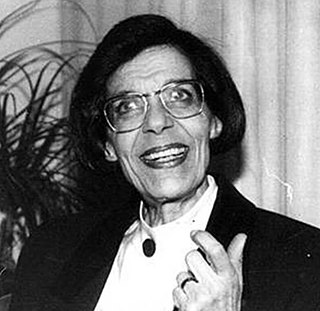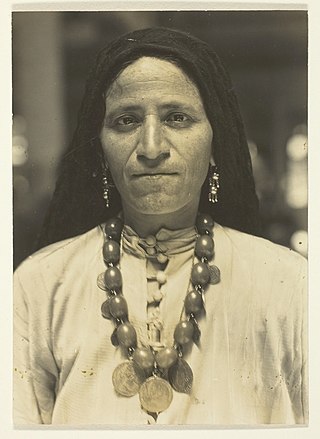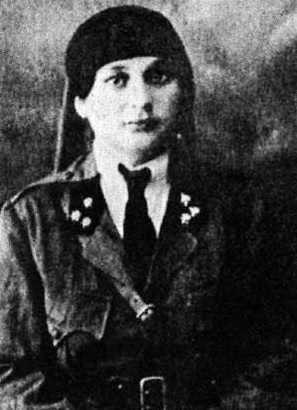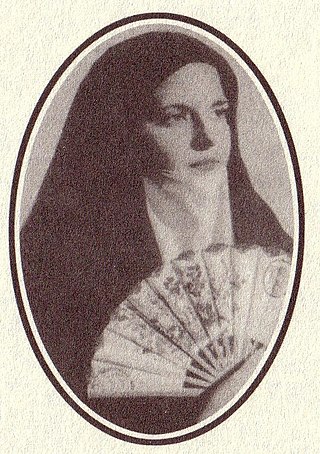
The culture of Lebanon and the Lebanese people emerged from various civilizations over thousands of years. It was home to the Phoenicians and was subsequently conquered and occupied by the Assyrians, the Greeks, the Romans, the Persians, the Arabs, the Crusaders, the Ottoman Turks and the French. This variety is reflected in Lebanon's diverse population, composed of different religious groups, and features in the country's festivals, literature, artifacts, cuisine and architecture of Lebanon. Tourism in Lebanon is popular with periods of interruption during conflict.

Suzanne Saleh Mubarak is the widow of Egyptian former president Hosni Mubarak and was the First Lady of Egypt during her husband's presidential tenure from 14 October 1981 to 11 February 2011. She has served as Goodwill Ambassador of the United Nations Food and Agriculture Organization, and founded the Cairo Child Museum in collaboration with the British Museum.
The Nahda, also referred to as the Arab Awakening or Enlightenment, was a cultural movement that flourished in Arab-populated regions of the Ottoman Empire, notably in Egypt, Lebanon, Syria, and Tunisia, during the second half of the 19th century and the early 20th century.

Christianity in Lebanon has a long and continuous history. Biblical Scriptures show that Peter and Paul evangelized the Phoenicians, whom they affiliated to the ancient Patriarchate of Antioch. Christianity in Lebanon is almost as old as gentile Christian faith itself. Christianity spread slowly in Lebanon due to pagans who resisted conversion, but it ultimately spread throughout the country. Even after centuries of Muslim rule, it remains the dominant faith of the Mount Lebanon region and has substantial communities elsewhere.

May Elias Ziadeh was a Lebanese-Palestinian poet, essayist, and translator, who wrote many different works both in Arabic and in French.

The roles of women in Lebanon have evolved throughout history. The legal status of women transformed over the 20th century, but traditional patriarchal norms and conservative versions of law continue to influence women's rights in Lebanon.

Laure Moghaizel (1929–1997) was a Lebanese attorney and prominent women's rights advocate. who was awarded the National Order of the Cedar (commander) in recognition of many years of social and public service.

Mounira Solh was a pioneer advocate for the rights of women and people with disabilities in Lebanon. She was one of the first women in Lebanon and the Middle East to run for parliament. She ran for a seat in the Parliament of Lebanon in 1960, 1964 and 1968. She was also a humanitarian with decades of volunteer and charity work.

Women in Syria constitute 49.9% of Syria's population. According to World Bank data from 2021, there are around 10.6 million women in Syria. As important members of the Syrian community, they are active participants in social, economic and political factions of society. However, Syrian women and girls still experience challenges, especially since the outbreak of the civil war in 2011, in the areas of legal rights, suitable healthcare and challenges precipitated by wartime violence.

Mother Superior Agnes Mariam de la Croix, also known as Mother Agnes, is a Lebanese Christian nun. She is mother superior of the monastery of St James the Mutilated in Syria, a Melkite Greek Catholic monastery in the town of Qara in the Homs diocese. She is outspoken in regard to the Syrian Civil War and, according to Foreign Policy is "one of the most prolific defenders of the" government of Bashar al-Assad.

Nazik Al Abid known as the "Joan of Arc of the Arabs" was a Syrian women's rights activist, nationalist, and critic of Ottoman and French colonialism in Syria. She was the first woman to earn rank in the Syrian Army for her role in forming the Red Star Society, a precursor to the International Red Cross and Red Crescent Movement, during the battle of Maysalun. She was a revolutionary for national independence and women's right to work and vote in Syria.

Zaynab Fawwaz (1860–1914) was a Lebanese women's rights activist, novelist, playwright, poet and historian of famous women. Her novel "حسن العواقب/Ḥusn al-Awaqib", is considered the first novel in Arabic written by a woman. Her play, "الهوى والوفاء/Al-Haawa wa al-Wafa", is the first play written in Arabic by a woman.

Esther Moyal was a Lebanese Jewish journalist, writer and women's rights activist. She has been described as a key intellectual in the 20th century Nahda, or Arab Renaissance.
Zahia Kaddoura was a Lebanese academic and a human and women's rights advocate. She served as a dean of the Lebanese University, and was the first woman to do so. Kaddoura was also the first Lebanese woman to earn a PhD from an Egyptian university.
The Syrian-Lebanese Women's Union was a women's organization in Lebanon and Syria, founded in the 1920s and active until 1946. It has also been called Lebanese Women’s Union, Syrian Arab Women's Union and Arab Women’s Union. It has been referred to as the starting point of the active women's movement in Lebanon and Syria.
Adila Bayhum-al-Jazairi (1900-1975) was a Syrian feminist, independence activist and philanthropist. She was a pioneer of the Syrian women's movement, as well as supporter of Syrian independence from France.
The Lebanese Council of Women or Lebanese Women's Council (LWC) is a women's organization in Lebanon, founded in 1952. It is an umbrella organization for the Lebanese women's movement.
Labibah Thabit, was a Lebanese women's rights activist. She was a pioneer figure of feminism in her country.
Ibtihaj Kaddoura was a Lebanese women's rights activist. She was a pioneer figure of feminism in her country.










